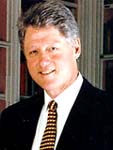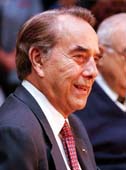Commentary/Ashok Mitra
Of elections, haut couture, crime and venality
 The US presidential election, held every five years on the first
Tuesday following the first Monday in November, are over. The
outcome of this year's presidential poll was so predictable as
to be denuded of all suspense. The losing candidate has complained
bitterly about the harmful influence of the pre-poll opinion,
surveys, which he considers as a major contributory factor for
his defeat. He has a point.
The US presidential election, held every five years on the first
Tuesday following the first Monday in November, are over. The
outcome of this year's presidential poll was so predictable as
to be denuded of all suspense. The losing candidate has complained
bitterly about the harmful influence of the pre-poll opinion,
surveys, which he considers as a major contributory factor for
his defeat. He has a point.
Statistical techniques and inferences
drawn therefrom have attained such a degree of sophistication
that actual happenings on election day have as good as lost
their relevance.
Tallies based on opinion polls can already indicate the final
returns. State by state, congressional district by congressional
district, even precinct by precinct. These exude an aura of certitude
which is the bequest of state-of-the-art information technology.
Forecasts have become the ultimate message. Even with barely one
per cent of the votes cast, straw exit polls can now predict,
to an eerie degree of precision, how the aggregate votes are going
to divide.
Excitement may still attach to individual contests, such as for
a closely fought senate seat or a gubernatorial slot. But the
big event, choosing the president, for the spell of the next four
years, of the world's most powerful nation, has been reduced to
a tepid formality. Give or take a decade or two, a situation may
well arise when the necessity on the part of voters to take the
trouble of trudging to the polling booths to exercise their franchise
would be the subject of serious debate.
Opinion polls, it could
be argued, should be invested with the formal authority to pronounce
the verdict, with everybody staying home to watch and listen to
post-election panegyrics on television.
Information technology, in other words, would decide the mandate
as well as the choice of the person to be charged with the responsibility
of implementing the mandate. Come to think of it, a denouement
of this nature is no longer a grotesque proposition. It merely
extends a trend that is already established. With counting completed
for barely 10 per cent of the ballots cast in the US presidential
poll, the candidate trailing to vote concedes, gracefully or otherwise,
victory to his opponent and goes to bed. It should therefore not
be at all mind-boggling if, at a certain juncture, the voters
are even spared the bother of casting the ballot.
Forecasting techniques would reach a foolproof state, and no scope
would exist for even a millimetre of discrepancy between the prediction
and the real outcome. Glorious uncertainties may still continue
to dominate cricket, but elections, democratic elections, would
have no parallel to draw with the otherwise charming game. Democratic
choice is serious business, so serious that the actual exercise
of suffrage by the voters would be dispensed with; forecasts would
be all.
 Some conservative elements insist on being around in all societies
till the bitter end. They will conceivably raise a moral issue
in the event the proposal to dispense with formal balloting is
sought to be pushed through. Are pre-poll opinion polls and surveys,
howsoever scientifically organised, basically in the nature of
campaign propaganda! The electorate consists of human species.
Human species are rational animals, but they have their occasional
failings. They are, for instance, vulnerable to the allure of
the herd instinct.
Some conservative elements insist on being around in all societies
till the bitter end. They will conceivably raise a moral issue
in the event the proposal to dispense with formal balloting is
sought to be pushed through. Are pre-poll opinion polls and surveys,
howsoever scientifically organised, basically in the nature of
campaign propaganda! The electorate consists of human species.
Human species are rational animals, but they have their occasional
failings. They are, for instance, vulnerable to the allure of
the herd instinct.
The possibility of a behavioural contradiction cannot therefore
be ruled out. Despite their predilection for free will, men and
women do not generally relish the idea of going it alone. It is
out of their free will that voters allow themselves to be interviewed
in the course of the pre-election polls and express their opinions.
|





 The US presidential election, held every five years on the first
Tuesday following the first Monday in November, are over. The
outcome of this year's presidential poll was so predictable as
to be denuded of all suspense. The losing candidate has complained
bitterly about the harmful influence of the pre-poll opinion,
surveys, which he considers as a major contributory factor for
his defeat. He has a point.
The US presidential election, held every five years on the first
Tuesday following the first Monday in November, are over. The
outcome of this year's presidential poll was so predictable as
to be denuded of all suspense. The losing candidate has complained
bitterly about the harmful influence of the pre-poll opinion,
surveys, which he considers as a major contributory factor for
his defeat. He has a point.
 Some conservative elements insist on being around in all societies
till the bitter end. They will conceivably raise a moral issue
in the event the proposal to dispense with formal balloting is
sought to be pushed through. Are pre-poll opinion polls and surveys,
howsoever scientifically organised, basically in the nature of
campaign propaganda! The electorate consists of human species.
Human species are rational animals, but they have their occasional
failings. They are, for instance, vulnerable to the allure of
the herd instinct.
Some conservative elements insist on being around in all societies
till the bitter end. They will conceivably raise a moral issue
in the event the proposal to dispense with formal balloting is
sought to be pushed through. Are pre-poll opinion polls and surveys,
howsoever scientifically organised, basically in the nature of
campaign propaganda! The electorate consists of human species.
Human species are rational animals, but they have their occasional
failings. They are, for instance, vulnerable to the allure of
the herd instinct.